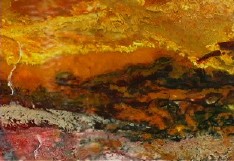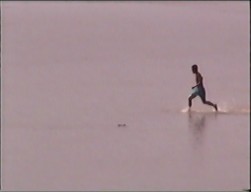

![Pasang Naik [The Tide]](shows/080227_SEAsianVisions.17/PasangNaik_TheTide_sm.jpg)
In either proclaiming or lamenting the world's interconnectedness under global capitalism, it has become almost a cliche to see "sameness" everywhere we look. Tonight's three short films gently take us elsewhere.
Cade Bursell's all that nature provides (2006) looks at the art practices of Luang Por Chaoren, the Abbot of Thamkrabok Monastery in Thailand. Here, an outline of a leaf becomes a song, the patterns of fallen tree limbs translate into chants, and rocks yield color for abstract paintings that map the history of the sites from which they were gathered. While the monastery is also internationally known for its effective drug detox program (originally developed for opium addicts who were considered parias in Thai culture), Bursell's half-hour film focuses on the creative practices which (literally) draw on nature's patterns and material and transform them, sometimes in an almost John Cage-like manner, into sounds and images. Cade Bursell is a former Bay Area resident and teacher whose experimental shorts include Skate, and Test Sites. She is currently teaching at Southern Illinois University, Carbondale.Bay Area Premiere.
Kiye Simon Luang's The Ephemeral Island (2005) is a quiet evocation of joy -- the joy brought by the temporary islands that emerge in the midst of Mekong River during winter season. Luang simply observes this liminal space between two shores and two countries (Laos and Thailand) and the elation that converges there for a brief moment. A young videomaker who lives and works in Marseilles, France, Luang is working on a long project on his family history in Laos, and The Ephemeral Island was shot during a research trip for the longer piece. The images, raw and shot without forethought, embody the sense of wonder of those moments when we are simply and wholly caught up in what we see. US premiere.
Amie Siegel's earlier Pasang Naik (The Tide, 1997) is a kind of anti-travelogue of sequence of single shot scenes, filmed in Cambodia, Indonesia and Thailand. Scott Stark, writes that the film "subtly affirms the distinction between looking -- gathering visual information -- and seeing -- applying meaning to that information. Each scene is a single shot, 20 or 30 seconds long, focusing on something that caught Siegel's eye: light refracting through a window, a ring dangling from the ear of a dancer, the shadow of a tree as it wavers across a noisy street. Locations are never revealed, and actions are never explained, making it impossible to exoticize, iconize or inform the imagery with any cultural bias. Instead an indisputable truth emerges: This happened here. Like so. Here is proof."
Amie Siegel has made a number of non-fiction and experimental films and installations including The Sleepers, the feature length Empathy, and German People. She is currently a Robert Fulton Fellow at the Film Study Center at Harvard University.